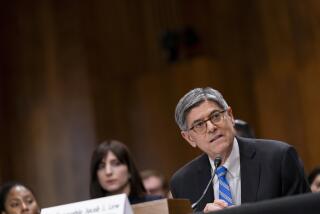Role of Robert Gates in Arms-to-Iran Affair
- Share via
A Times article (Editorial Pages, April 1), “Iran Affair Was Standard Fare,” Robert Morris inaccurately stated: “ . . . the nomination of CIA Deputy Director Robert Gates to succeed the ailing William J. Casey had to be withdrawn after it was revealed that Gates, in a 1985 memo to the White House, formally and enthusiastically favored the arms deal with Iran.”
In the first place, Gates’ nomination was not withdrawn for the reasons Morris cites. In his public statement dated March 2, Gates said that no one asked him to withdraw his nomination and that President Reagan had never ceased his support of it. Gates took the initiative himself to ask the President to withdraw the nomination, believing that while he probably would ultimately have been confirmed, a protracted struggle with Congress over the matter would damage the agency and intelligence community and prevent them from getting on with their important tasks. He said he believed it was impossible for them to do so while his nomination was pending. The White House issued a similar statement when President Reagan acted on Gates’ withdrawal request.
Secondly, Morris’ statement that Gates “in a 1985 memorandum to the White House, formally and enthusiastically favored the arms deal with Iran” is without foundation. Morris is apparently referring to a New York Times story, which erroneously asserted that Gates encouraged, approved and disseminated a paper by the national intelligence officer for the Middle East in May, 1985, recommending that the United States consider allowing European arms sales to Iran.
In a letter dated March 2 to Sen. David. L. Boren (D-Okla.), the chairman of the Senate Select Committee on Intelligence, Gates responded to this story. He told Boren: “The memorandum was prepared by the NIO at his own initiative. I did not know that the paper was being drafted, and neither saw nor approved it prior to distribution. I received my copy simultaneously with others inside and outside CIA. The NIO’s actions were consistent with my policy that intelligence analysts feel free to challenge conventional wisdom and provoke debate.”
GEORGE V. LAUDER
Director, Public Affairs
Central Intelligence Agency
Washington
More to Read
Sign up for Essential California
The most important California stories and recommendations in your inbox every morning.
You may occasionally receive promotional content from the Los Angeles Times.













